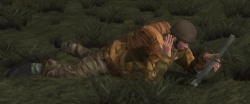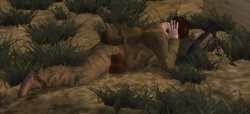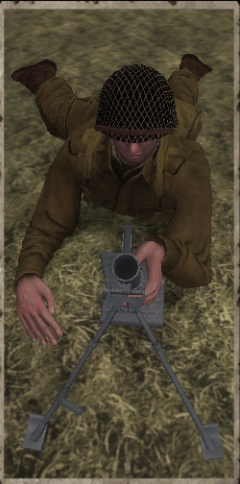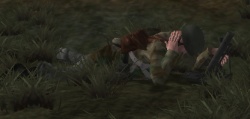Difference between revisions of "Airborne Mortarmen"
| (One intermediate revision by one other user not shown) | |||
| Line 116: | Line 116: | ||
</center> | </center> | ||
[[Category: | [[Category:Mortar]] | ||
[[Category:Infantry]] | |||
Latest revision as of 05:23, 26 July 2023
Overview & Game Play
Although the mortar existed for centuries, the first portable mortar dates to World War I. Although especially useful in trench warfare, the portable mortar retained its usefulness even after the war as a way to quickly provide indirect fire support against soft and hard targets in the heat of battle.
The mortarman depends on teamwork more than any other class: He's completely vulnerable to enemy infantry when deployed, goes through his ammo quickly, and is usually unable to see where his rounds are landing. That said, his ability to contribute is also great: One or two mortarmen can effectively close an area to enemies without exposing themselves, allowing allies to set up positions there or forcing the enemy to advance into a more easily defended location. Their smoke rounds can also blind enemy armor, either forcing them to move or giving friendly infantry and ATGs a chance to get into position to properly deal with them.
Airborne mortars are the least used Mortar unit but do come in hand occasionally if they are in a hard to reach spot that they can prove a smokescreen from. Using the Mortar
Equipment
British
The British Army began producing the 2 Inch mortar in 1938. Small, simple, and relatively easy to use, it was very portable. It also had greater range and firepower over hand and rifle grenades, enhancing the ability of infantry platoons to screen their movements with smoke grenades, or attack targets behind cover with high explosive rounds.
The mortar had a short barrel making it necessary for a soldier to aim it by hand, rather than using a bipod or support, but this contributed to its portability. The short barrel made it necessary to be fired by trigger, rather than simply dropping mortar rounds into the barrel.
Although it originally had collimating and cross-level bubbles to aim it, these were determined to be unnecessary and were dropped in favor of a white aiming line painted on the barrel, which did not affect the accuracy of the mortar in trained hands.
Because of the simple and straightforward design of this light mortar, it was kept in service until the 1970s.

|
| British Light Mortarman |
| Equipment |
| Ordnance SBML 2 Inch Mortar |
| Mk I Mortar Bomb (HE) |
| Mk II Smoke Mortar Bomb (Smoke) |
| Lee-Enfield No.4 Mk I |
| Combat Knife |
French
This very light mortar was designed as a replacement for the rifle grenades used in infantry platoons. The German army later used it with the designation 5 cm Granatwerfer 203(f).
Like the German and British light mortars, this short-barreled mortar was fired by trigger.

|
| French Light Mortarman |
| Equipment |
| Lance-grenades de 50 mm mle 37 |
| Grenade de 50 mm 3NT (HE) |
| Grenade fumigène de 50 mm (Smoke) |
| Fusil MAS mle 1936 |
| Combat Knife |
American
This very light mortar was designed as a replacement for the rifle grenades used in infantry platoons. The German army later used it with the designation 5 cm Granatwerfer 203(f).
Like the German and British light mortars, this short-barreled mortar was fired by trigger. In game it is issued to American troops as well.

|
| American Light Mortarman |
| Equipment |
| Lance-grenades de 50 mm mle 37 |
| Grenade de 50 mm 3NT (HE) |
| Grenade fumigène de 50 mm (Smoke) |
| M1903A3 Springfield |
| Combat Knife |
German
Originally produced with a complicated telescopic sight, these light mortars were quickly simplified to a simple white aiming line in 1938. Although over 25,000 of these were made by 1943 and they were used to some extent throughout the war, after 1941, the German infantry had a preference for captured French and Russian 50 mm light mortars, which relegated the Granatwerfer 36 to use in secondary units and the Italian army.
Because of its short barrel, this mortar was fired by trigger. It had a support arm that limited its elevation range to between 40 and 80 degrees, support its purpose of attacking at high angles.

|
| German Light Mortarman |
| Equipment |
| 5cm leGrW 36 (Granatwerfer 36) |
| Wurf Granat 36 (HE) |
| Wurf Granat 36 Nebel FS (Smoke) |
| Mauser Karabiner 98k |
| Combat Knife |